How are we shaped by our experiences? In this episode, the Fellows share moments in which their perspectives about work, diversity, and even the city of Philadelphia, were altered. There are stories of first jobs, world travel, realizations about the nature of success, and more.
You can enjoy the episode in its entirety or listen to segments from particular Fellows.
Frank 5 Episode 3 (Perspectives): Full Episode
How are we shaped by our experiences? In this episode, the Fellows share moments in which their perspectives about work, diversity, and even the city of Philadelphia, were altered.
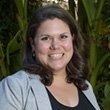 “The thing I think about most is the late night debates.”
“The thing I think about most is the late night debates.”
Kara Peterman ’09 speaks with Professor K. Elizabeth Stevens.
Kara is a structural engineering experimentalist who joined the department of Civil and Environmental Engineering at UMass Amherst in 2016. She is passionate about outreach and has promoted the advancement of underrepresented groups in engineering for over a decade.
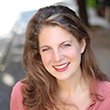 “It made the city feel bigger.”
“It made the city feel bigger.”
Nell Bang-Jansen ’11 speaks with Professor Tim Burke.
Nell is a Philadelphia-based theater director and creator and is currently working on a theater piece made with and for people who work as caregivers.
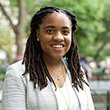 “I learned that there are different ways you are asked to show up.”
“I learned that there are different ways you are asked to show up.”
Marissa Davis ’08 speaks with Professor Rachel Buurma.
Marissa is a bridge-figure, social engineer and advocate for creating sustainable pathways to a better quality of life for historically disenfranchised communities.
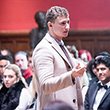 “There’s an enormous demand from millennials.”
“There’s an enormous demand from millennials.”
Sam Sussman ’13 speaks with Professor Krista Thomason.
Sam is the co-founder of Extend, a start-up NGO focused on conflict resolution education in Israel-Palestine. He’s also an award winning screenwriter.
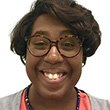 The biggest thing was getting out of my community.”
The biggest thing was getting out of my community.”
Kimberly St. Julian-Varnon ’12 speaks with Professor Sa’ed Atshan.
Kimberly is a high school history teacher and community college professor. She’s also a Texan, African-American woman, Russian-speaker, and Magic the Gathering player.
Frank 5 Episode 3 (Perspectives): Transcript
Tim Burke: It’s the Frank Five Fellows podcast series, informal conversations with recent liberal arts grads. They’re in business, they’re engineers, they’re educators, they’re artists. In this episode, the fellows and their faculty partners share life changing moments. Moments when their perspectives about work diversity, even the city of Philadelphia were changed. There are stories of first jobs, world travel, realizations about the nature of success and more. Up next Cara Peterman and Elizabeth Stevens.
K. Elizabeth Stevens: Outside of the classroom maybe, are there educational experiences that you realize in retrospect had an impact on your development?
Kara Peterman: Yeah, absolutely. The thing I think about most is, is that late night debates in the dorms especially in my freshman year. I was in, I was in Willets, Willets second south, and my friends and I on the hall, we used to stay up until all hours in the morning just talking about life and talking about social issues and political issues. At that point in my life I had been a pretty sheltered naive high schooler in a wealthier part of the country and a lot of things, it’s a privileged position. A lot of things that were going on with the world at large, and the community beyond my hometown were just not a part of my thinking. Not a part of my thought process. And all of theses discussions, all of these debates until 4:00 in the morning, really opened my eyes to things I was not even thinking about in the slightest. So it was in that first semester I remember I came back home and my world view had changed even just by October break. It’s still a process that I still do, you know, keeping my mind open and keeping my experiences in check, so that when somebody comes along with a totally different lived experience or a totally different history from mine, we can discuss and debate and share and I can come away … hopefully we both come away with an expanded worldview.
Burke: up next Nell Bang-Jensen and Tim Burke.
Nell Bang-Jensen: Then I did a Watson year, so I left Philadelphia and saw the larger world and I do think coming back after that shaped everything. Philly looked really different to me after that experience.
Burke: Did it seem smaller? Bigger? What was different about it when you came back?
Bang-Jensen: I think one thing the Watson did, it actually made the city feel bigger because I had a different understanding of the multitude of different lives that people can lead. I think living with families in Bali or Morocco or Zambia, Ireland, I remember just thinking to myself on that year all the time, we are all in this world and how crazy is that, that I just happened to be intersecting with these people in this way. I think coming back to Philly and just seeing people on the street and realizing the different combinations that we’re putting together in our daily lives actually made it feel quite expansive and made me think a lot about my own role within it. What my biases were in putting together that life, or my daily patterns or rituals and how that affected sort of how I moved about the world. So in a funny way, I think actually seeing more of the world made it seem even bigger because you just start to see the many different ways people put together a life
Burke: Up next, Marissa Davis and Rachel Buurma.
Rachel Buurma: What was or maybe even remains challenging. But what did you learn in that first job that you use?
Marissa Daivs: That I’m even still taking with me and thinking about to this day. First and foremost, I think I learned that … there are different ways that you can, that you are asked to show up at least in a workplace. And when I say that there is, there are certain expectations that are had of you in terms of what it is at two you need to do to perform the job well. And if at any point there is a perception or the reality that you aren’t performing the job well, the rest of who you are doesn’t really matter. I didn’t realize that, I think coming in, I thought okay people will get to know the fullness of me and once they got to know all of me then they could have a better understanding for why I do things the way I do them. You know, for example, one of the things that I was tasked to do as a paralegal at this firm being detail oriented was, was a very important part of the job and going in I certainly had some attention to detail, but it wasn’t something that I prioritized as much because in my mind it was better to think about the bigger picture and the different pieces would come together one way or another as I thought about the bigger picture.
Learning that at least within this particular experience, my job wasn’t to be the big picture thinker. My job was to be the detail oriented person. It was to support the individuals who are the bigger picture thinkers of folks who had to think through what kind of legal theory they’re going to incorporate in their briefs or how to think about addressing a particular case. So while it was certainly, it could be additive, that I had a particular thought or on a case, first and foremost I had to do the job well at making sure that the case files were organized well. That I knew exactly where to find the different documents that the attorneys needed. I think shifting my focus and reality from being used to being the person that people wanted to hear from, you know, to hear my ideas, to actually focusing on doing this, this specific piece of this job well was a tough experience for me.
Burke: Up next, Sam Sussman and Krista Thomason.
Krista Thomason: Right. So I wanted to ask you a little bit actually about recruiting that you mentioned a minute ago. When you were doing recruiting for the first trip or even after that sort of subsequent trips, what kinds of things do you tell people to try to get them to say yes?
Sam Sussman: It’s not like a … We don’t think of it as a product that we’re selling. It’s more, there’s an enormous [inaudible 00:08:12] from millennial American Jews to be exposed to a more nuanced sense of what Israel Palestine looks like. There are a lot of programs you can go on that will give you a very strong sense of what Israelis from roughly the center, right to the far right think. There are an awful lot of organizations that won’t meet with people outside of that set of views. So I mean we’re dealing with, we never have a problem filling the bus. We’re dealing with a whole generation that’s committed to having a more nuanced understanding of what’s happening. With that said, there are certain things I want people to know before we get there. I want people to know that they’re probably going to meet three or four people every day with whom they deeply disagree and that’s okay and that, that’s part of having an educational experience. I want people to know that … I guess in the same way that if you’re running a seminar, you don’t want people to feel like they’re doing intellectual battle with each other, but that they’re learning from each other.
I want people to understand that everyone we meet with is a person of good faith, whatever they might, whatever particular political issue that might disagree with you on. That people who believe that through conversation and dialogue, you can reach and change other people and you can learn from them and you can change yourself. If they didn’t believe that they wouldn’t be welcoming us into their homes. So over time I’ve definitely taken more of an effort to, before the program starts to really emphasize that it’s not about proving this or coming away having checked that box, you know? Yes, I learned that this is, I confirmed that people really think this never a good way to go into an educational experience. So those are the sorts of things that we try to focus on.
Burke: Up next, Kimberly’s Saint Julian Varnon and Saeed Datshahn.
Sa’ed Atshan: You mentioned, you know thinking that you would be a corporate lawyer, etc. So what is it about your college experience that changed your thinking about, you know, some of these objectives that you had of six figures or working in the domain of corporate law, etc.
Kim St. Julian-Varnon: I think the biggest thing was getting out of my community. When you live in a rural place that doesn’t have a lot of jobs, poverty is always an issue and oftentimes when you grow up poor, and I didn’t even know I was considered poor until I went to Swarthmore and they started talking about the poverty line. I was like, “Oh, I’m poor. Okay.” I learned this because I didn’t have to want for anything. But when you grow up like that, having enough money is a constant concern. So a job that will give you loads of money, will provide you with that comfort so you don’t have to worry about, you know, a rainy day. So I knew that that was part of why I wanted to be a corporate lawyer. Plus the only experience I had with the attorneys at that point was TV and I knew I really liked them because they were always sleek and powerful and well dressed. So it was something I thought I wanted to do, but Swarthmore definitely opened my eyes.
I also think as a person of color coming from a rural community that’s dominated by football, most of the students of color who get out of Dayton, they play sports, especially football. So I wasn’t good at sports and I knew I had a brain and that was the only way out. So I focused on that and Swarthmore opened my horizons and changed my ideas of what success could be. That success isn’t necessarily tied to a dollar amount. I think that was the biggest thing I took away in terms of what success can look like. You can be a doctor, you can be a lawyer, you can be a peace corps volunteer, you can be a secondary teacher, elementary teacher it, living in a type of life that you want to live. It’s the key to that success. And I did not think that before I went to college.
Atshan: Mm-hmm (affirmative), mm-hmm (affirmative). So did your liberal arts education open you up to perspectives other than your own? Did your education challenge what you thought you knew? If yes, how?
St. Julian-Varnon: Absolutely. The multitude of ways that I was changed. So where do I even begin with that? My views on … I think one of the most interesting things that changed about me in terms of my views was my view on like military and war, especially, and my dad’s a Vietnam war vet. My uncles is a Vietnam war vet, and so a lot of people in my community, especially boys who were around 18 when I was in high school, they joined up. They joined the military and they have fought in Iraq and Afghanistan and so I had this idea of patriotism that was very much shaped with you have to support the troops. You have to support the troops and I didn’t really understand what that meant.
I just thought it meant like if they go to war, you have to support the war. Going to Swarthmore at that time, it challenged my thinking and it challenged the way I understood my support of the troops and that I could support my friends who are fighting in Iraq and Afghanistan even if I disagree with the war. And that supporting them also meant when they came home to the United States, making sure that they had a community that would envelop them and help them. Making sure that they had resources like the VA and beyond to help them readjust. I think that’s one of the hugest things I’ve taken away now as a teacher where I have so many students who want to join the military because it’s often presented as one of the few ways out. They see the signing bonus and they go for it. And I can have those conversations with them now and say, “This is an option, but understand this is what you are getting yourself into and these are the ideals that you are promising that you will fight for,” and they have to understand that they might not come back.
Because some of my friends, their best friends in the military if not come back. So those are things I learned in ways to speak about it, are ways that I’ve learned from Swarthmore that I don’t think I would have had outside of that.
Burke: Thanks for listening. This podcast was produced by the Aydelotte Foundation and the Language and Media Centers at Swarthmore College. To learn more, visit www.swarthmoreedu/aydelotte-foundation.
